Copeland GDF Working Group Newsletter
In this month’s edition you’ll find information about two online events we’re holding, as well as details of how you can give us your views as we begin work on considering Search Areas. Our newsletter also features the role of the regulators in the GDF project – the Environment Agency and Office for Nuclear Regulation (ONR) – and we have a blog from Ivan Baldwin, Chair of the Britain’s Energy Coast Business Cluster (BECBC).
The first in a series of webinars starts this month to provide information about what a Geological Disposal Facility (GDF) for higher activity radioactive waste is and what it could mean for Copeland.
Some of our team will talk about their role in the Working Group, the importance of community engagement and how people’s views will feed into these early conversations. We’ll also hear from Radioactive Waste Management (RWM) on what’s different about the GDF project this time around and work on identifying a Search Area.
Please do register for the free webinars on March 23, they’re being held at 12pm and 7pm (find details of the simple registration below). Questions can be asked in advance or submitted during the event. We want to hear from you – your thoughts, concerns, issues and views are all welcome.
We can shape our future webinar topics around what people want to know more about and the questions they would like answered – so let us know.
If you’d like to have a look at some information before the events, then our Virtual Exhibition is an easy way to access information. It’s got videos, graphics and content to suit every need, please click here.
Our website is also a really good tool – you’ll find everything from what a GDF is, why it’s needed and our latest news, to how you can get involved and some Frequently Asked Questions. It also has the Initial Evaluation Reports from our four interested parties which each proposed an area of interest in Copeland.
The geographical area initially being discussed is the whole of Copeland Borough, with the exclusion of the area within the boundary of the Lake District National Park. The potential for development of underground facilities off the coast, accessed from land, will also be considered.
The initial Search Area work is now starting to take place and gathering views is very much a part of this. We have a range of information about the wider Copeland area, but we would like to gather more and it’s really important that we hear the views of local people as we do this. Please read on in the newsletter to find out more.
As part of the nationwide search in England and Wales for a potentially suitable location to host a GDF, our Working Group has three main tasks – beginning to understand community issues, concerns and questions about GDF; identifying a search area or areas within Copeland which could then be further investigated for potential locations for a GDF, and identifying initial members for a Community Partnership that could take that work forward.
The Working Group will not identify specific sites or decide on locations, it will merely suggest areas for further consideration potentially by a Community Partnership.
Do get in touch: gdfinfo-copeland@nda.gov.uk or telephone on 0300 0660 100.
Mark Cullinan – Independent Chair, Copeland GDF Working Group

Join geological disposal online events – what is it and what’s different this time?
Two online events are being held by Copeland GDF Working Group to discuss geological disposal and what it could mean for Copeland.
They are the first in a series of interactive webinars to provide information around what is a Geological Disposal Facility (GDF) for higher activity radioactive waste. Questions can be submitted in advance.
Discussion topics will also include what’s different about the GDF project this time around and work on identifying a Search Area.
The events will include presentations from the Copeland GDF Working Group and Radioactive Waste Management (RWM).
Working Group Chair Mark Cullinan said: “We’re in the early stages of our conversations in Copeland and understanding people’s views now, as well as enabling people to access information, is very important to us.
“Please take part in these webinars to learn more about geological disposal and let us know your views and questions. Community consent is at the heart of the process and a GDF cannot be built unless there’s a suitable site and a willing community.”
The two events will take place on March 23 at 12pm or 7pm, and are open to anyone – members of the public, business communities, local group representatives – who would like to find out more.
To pre-register for one of the hour-long events and submit your questions, click here, questions can also be submitted during the webinar.
Topics for future webinars will include geology and can also be guided by what further information people would like.
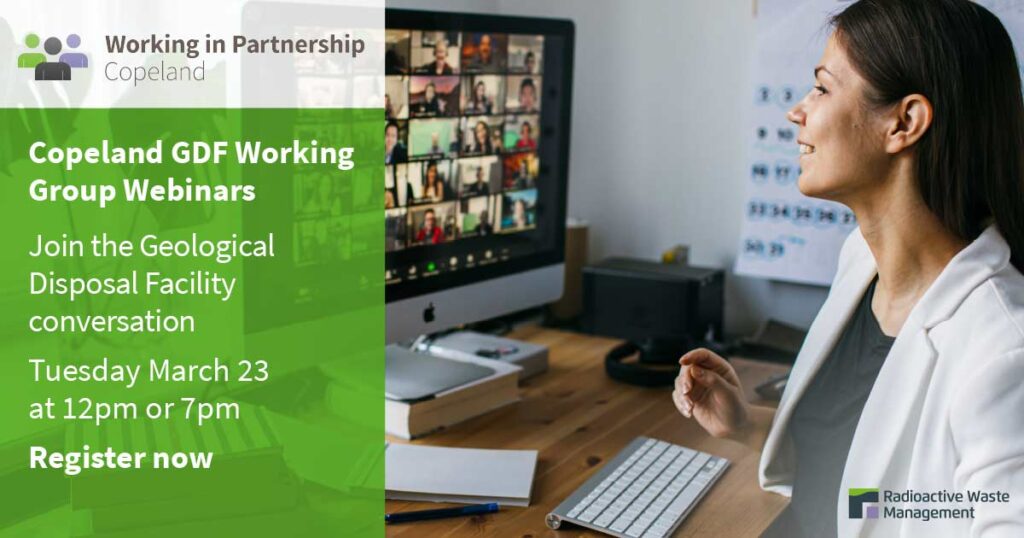
Copeland GDF Working Group seeks local views
The Copeland GDF Working Group would like to hear views from local people as it begins work to identify where in Copeland – including the area off the coast – could be considered for a Geological Disposal Facility for higher activity radioactive waste.
Formed in November, the GDF Working Group has started local engagement and is providing a range of information for people. One of the Group’s tasks is to identify a Search Area (or Areas) that could be considered further by a Community Partnership and it will do this by taking into account a range of published information, but it also wants local people to share their views.
Mark Cullinan, Independent Chair of the Copeland GDF Working Group, said: “We’ve begun work to look at where to start. We already have a range of information about the wider Copeland area, but we would like to gather more and it’s really important that we hear the views of local people as we do this.
“As the Search Area (or Areas) are identified, the views from local people will be used to inform the Working Group. The Working Group will look at all feedback alongside the gathered information we have about the Copeland area. We welcome local views and I would encourage people to look at the information we’ve made available on our website and to get in touch to let us know what they think.”

Working Group Map
The Working Group has a range of information about the GDF project, including a set of Initial Evaluation Reports which were produced by Radioactive Waste Management (RWM). The reports concluded there may be potential to host a GDF in Copeland and the adjacent inshore area. The area within the current or proposed future boundaries of the Lake District National Park has already been excluded.
Barnaby Hudson, RWM Siting Manager, added: “The Search Area (or Areas) can be refined further over time if a Community Partnership is formed and as we gather increasing levels of information from our investigations. The identified Search Areas are a starting point in the GDF siting journey, which is envisaged to take several years. The Working Group will identify prospective Community Partnership members that reflect the communities in the Search Area(s) but that membership will also continue to evolve and develop over time.
“Ensuring there’s balance between environment, social and economic factors can be challenging. To aid the Working Group in scoping future conversations we’re asking for people’s views on what local matters are important to them.”
The Working Group welcomes any requests for information from the public and views can be shared by contacting the Working Group via email: gdfinfo-copeland@nda.gov.uk; by telephone 0300 0660 100, or writing to: Copeland GDF Working Group, Building 329, Thomson Avenue, Harwell Campus, Didcot OX11 0GD.
The website also has a lot of information and further reading: www.copeland.workinginpartnership.org.uk, and you can sign up to a monthly newsletter.
Virtual Exhibition
The Copeland GDF Working Group Virtual Exhibition is getting lots of views with people taking in the interactive digital experience as a way of finding out more information about geological disposal.
Click here to take a look at the graphics, videos and information about what a GDF is and what it could mean for Copeland.
All views, questions, comments are always welcome – do get in touch: Please call 01925 802830 or email gdfinfo-copeland@nda.gov.uk
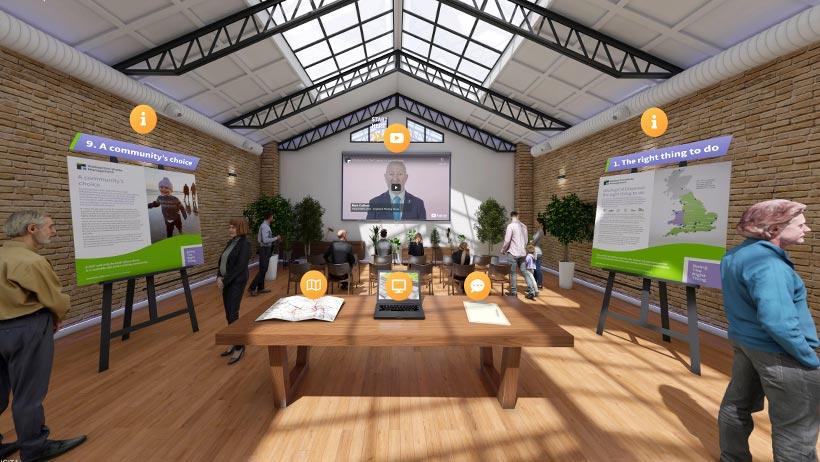
Meet the Regulators – regulating geological disposal
The Environment Agency (EA) and the Office for Nuclear Regulation (ONR) are working together to make sure that any Geological Disposal Facility (GDF) in England will meet their requirements for protecting people and the environment when it is being developed, while it is operating and after it has closed.
Both organisations have offered to support Copeland GDF Working Group by explaining how their regulatory roles and processes will help ensure protection of people and the environment now and in the future. This could involve attending meetings and events, providing information about regulation of a GDF and commenting on matters concerning environmental protection, safety, security and transport of radioactive materials.
The regulators aren’t members of the Copeland GDF Working Group and will not be involved in its decision-making, or in decisions to select sites for further consideration. They do not regulate the site selection process.
Environment Agency
The Environment Agency is responsible for implementing and enforcing environmental protection legislation in England. Its responsibilities include regulating waste from industry and the treatment of contaminated land, water quality and resources, fisheries, conservation and ecology and managing the risk of flooding from rivers, reservoirs, estuaries and the sea.
Operators of nuclear sites must have a permit from the Environment Agency. Through permits, the Environment Agency sets conditions on how each site disposes of its radioactive waste, including any discharges to air and water. The Environment Agency checks that operators don’t release radioactivity above pre-agreed limits and that they use the best available techniques to minimise the radioactive waste they create and the radioactivity they discharge.
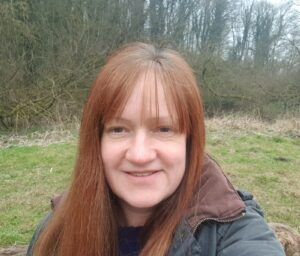
Dr Candida Lean, Nuclear Waste Assessor, Environment Agency
The Environment Agency has over 10,000 staff working from offices across England. Many of its nuclear regulation team specialists are based in the EA’s Penrith office. Dr Candida Lean is a Nuclear Waste Assessor and will represent the Environment Agency at the Copeland GDF Working Group.
She said: “The Environment Agency is responsible for making sure that the high standards we have set to protect people and the environment are met by RWM when implementing geological disposal. This includes during the design, development, construction, operation and closure stages. We will only grant an environmental permit for a GDF if it demonstrated at each stage that our high standards were met. Our regulation would begin if RWM decides there is a need for surface-based investigations such as borehole drilling.
“We look forward to providing support to the Copeland GDF Working Group and the local community, and to describing how we would regulate a geological disposal facility and how our regulatory roles and processes will help ensure protection of people and the environment now and in the future.”
Office for Nuclear Regulation
The Office for Nuclear Regulation (ONR) is the independent regulator of nuclear safety and security on 36 licensed nuclear sites in Great Britain. The ONR also regulates the transport of radioactive materials and ensures the UK’s nuclear safeguarding obligations are met.

The Office for Nuclear Regulation (ONR) is the independent regulator of nuclear safetycand security on 36 licensed nuclear sites in Great Britain.
With just over 650 staff and specialists in disciplines as varied as chemical engineering to nuclear physics, the ONR is a well-respected and trusted regulator, with a proven track record of world-class nuclear regulation.
Dr Peter Howden who is one of ONR’s specialist inspectors explains more about ONR’s role in regulating a future Geological Disposal Facility (GDF): “We do not regulate the site selection process for a future GDF, nor do we have a decision-making role in the process for identifying and selecting sites for investigation. Our regulatory role begins when a preferred site has been identified and a nuclear site licence application has been submitted.
“The site licensing process is a rigorous process and will involve a detailed examination of a whole range of different issues by our specialist inspectors. Our role is to protect society by ensuring the nuclear industry operates safely and securely, and we will only issue a nuclear site licence for the construction of a GDF to commence if we are satisfied the facility will be safe and secure.”
Further information and contacts:
A short animation about the regulators’ role https://youtu.be/HY9gcwhCDB4
Read about the regulators’ roles in regulating a future GDF
Environment Agency https://www.gov.uk/guidance/regulating-the-geological-disposal-of-radioactive-waste-environmental-protection
Office for Nuclear Regulation http://www.onr.org.uk/geodisposal.htm
Email the Environment Agency: nuclear@environment-agency.gov.uk
Email ONR: contact@onr.gov.uk
Ivan Baldwin, Chair of Britain’s Energy Coast Business Cluster (BECBC), gives his views on having a GDF Working Group for Copeland and its businesses, as well as his thoughts on long-term disposal of nuclear waste.
“BECBC is a private sector led cluster of over 300 businesses, that has been operating for over 17 years. It’s an organisation focused on industry in Cumbria and further afield, embracing nuclear since its inception and other clean energy technologies as they have developed over this period, up to the Net Zero focused environment that we live in today.
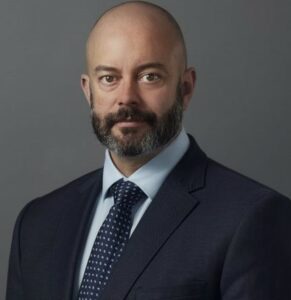
Ivan Baldwin
The UK is taking a world-leading role on clean energy, being first to bring Net Zero 2050 into law and identifying nuclear as key to base-load electricity generation alongside renewables. This is excellent news for Cumbria and its network across the wider North, as a region which has been at the centre of the UK’s nuclear mission since the 1940s, a place of world firsts in energy, fuel, recycling, nuclear medicine and environmental clean-up.
Whilst future nuclear paths toward a greener future are being established, the industry is strengthened by a forward-looking Nuclear Decommissioning Authority and its continued commitment to cleaning up the nation’s nuclear legacy.
To this end, the timing of the first Geological Disposal Facility (GDF) working groups being established in Copeland and Allerdale couldn’t be better. Not only is it promising for the community through jobs and skills development and the supply chain but also offers clarity on how we will deal with the long-term disposal of our nuclear legacy.
The approach brings together the two key elements of finding a suitable location for the site as well as a willing community. BECBC as an organisation is rooted in the importance of place and ensuring that communities have a voice at the top table- welcomes this approach. Community, to us, includes the people and organisations that live and work in a place, those who want to see sustainable future for their children and generally a better place to live. Business has a really important part to play here, ensuring that massive projects such as the GDF deliver real social value in the places they are located.
Social value in this case, not only includes the thousands of construction and supply chain jobs, but the regional capability and intellectual property that will be developed – described as economic ‘sticky-balls’ by some. Similar to the North East, which over the years has become synonymous with automotive manufacturing excellence, projects like GDF and new nuclear power developments offer real promise of creating exportable, long-term business for the places they will call home.”
Open to question
Since the Working Group was launched, we’ve had a range of questions from the public. Each issue we’ll aim to answer questions, and there are more on our website.
How will a suitable site be chosen?
Potential sites will be evaluated according to six factors:
- Safety and security – safety and security must be assured by independent regulators. A GDF will only be built if RWM, and regulators, are satisfied it is safe.
- Community – communities are at the heart of the process. Social and economic opportunities, community wellbeing, and how a GDF can align with the host community’s vision will all be considered.
- Environment – a GDF is a major environmental protection endeavour. Construction will need to meet independent regulatory requirements.
- Engineering feasibility – need to ensure there is scope for sustainable design and the ability to construct and operate a GDF in a location.
- Transport – the safe, secure transport of waste, people and other materials.
- Value for money – a duty to secure value for money.
What is the incentive for a community to get involved and potentially host a GDF?
The Working Group will hopefully lead to a longer-term Community Partnership being set up.
At this point, there will be an immediate £1m per year of community investment funding available for projects, schemes and initiatives to drive economic development, improve the environment and the community’s well-being.
This funding will increase to £2.5m per year if deep investigative borehole drilling gets underway, but the major benefit is how a GDF will help a community meet its long-term vision for itself.
The community that takes the opportunity to host a GDF will receive significant additional investment and long-term benefits for future generations, including jobs and skills.
Will a GDF be forced on a community?
No – this is a process in which communities have the opportunity to choose if they want a GDF in their area or not.
No community will get a GDF unless it wants one.
Will a GDF be safe?
A GDF will only be built if it can be shown to be safe and secure. If the UK’s independent nuclear safety and environment regulators don’t think it is safe and secure for people and the environment, both for now and for the future, then it won’t be built.
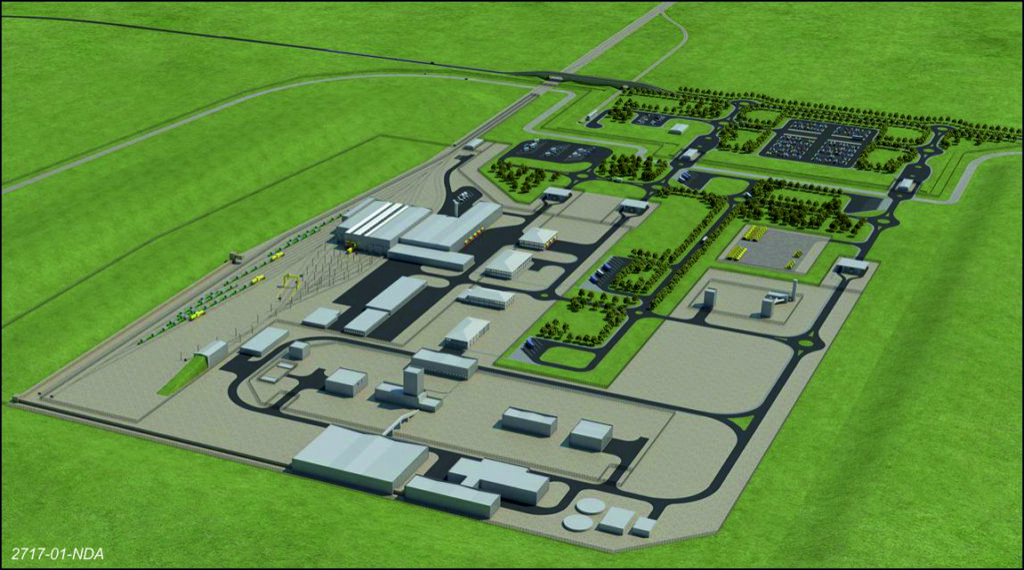
An illustrative aerial view of a GDF surface layout.


